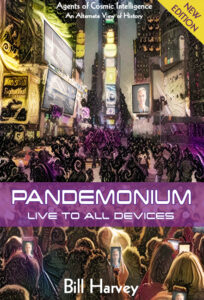 This novel, by the Emmy Award- winning media technologist Bill Harvey, is Milton’s epic poem Paradise Lost transported into the mid-twenty-first century and translated into an action packed, sex filled, page-turning political thriller. Relevant even to a secular reader, it tells the story of the war for Heaven and Earth, and is a meditation on rebellion, loss and redemption, and what it means to be human. It is an attempt to make sense of a fallen world, and in the words of Milton, “to justify the ways of God to men.”
This novel, by the Emmy Award- winning media technologist Bill Harvey, is Milton’s epic poem Paradise Lost transported into the mid-twenty-first century and translated into an action packed, sex filled, page-turning political thriller. Relevant even to a secular reader, it tells the story of the war for Heaven and Earth, and is a meditation on rebellion, loss and redemption, and what it means to be human. It is an attempt to make sense of a fallen world, and in the words of Milton, “to justify the ways of God to men.”
It’s told from the point-of-view of an ensemble cast of psychic warriors, a specialist military team of psychic warriors known as the Theta Force—who travel the world to prevent World War III and to heal the wounds of a second American civil war. Cinematic in its writing, it’s easy to visualize the action and the characters in a range of exotic settings, with lots of sex, and interesting technology, like in a classic James Bond movie.
But the center of the story is an attempt through fiction to resolve the contradictions between a secular world view and a spiritual view of reality.
As a leading guru to the advertising media industry, Harvey’s prognostications about the future of communications technology appear to be spot on, and, to me, provides much of the humor in the book. Imagine trying to move through a city while being continuously accosted by holographic human spam trying to strike up chatbot conversations—it’s both funny and disturbing, because it’s not that far off.
And as an advisor to the US Army on optimizing human effectiveness, Harvey’s descriptions of near future military technology deployed on battle grounds from the mountains of Tibet to the South China Sea are both exciting and credible.
But the real battleground in this book for these psychic warriors is the human mind. In the words of Milton’s Lucifer, reincarnated in this story as the arch-rebel Perse, “The mind is its own place and in itself/Can make a Heaven of Hell, a Hell of Heaven.”
The psychic warriors—both heroes and rebels—are in fact “angels”, beings operating at a higher level of consciousness who have been on Earth, reincarnated over many lives, for over 200,000 years. Consciousness is the central theme of this book. In one of Harvey’s insightful observations, he notes “The most important human quality is the ability to control one’s own mind.”
Consciousness is the deepest of all philosophical problems, which the ancient Greeks described as the Mind-Body problem, and which the greatest of our modern scientific minds have not shied away from also thinking about. In the words of Max Planck, winner of the 1918 Nobel Prize in physics, “In the last analysis, we ourselves are part of the mystery we are trying to solve.” Or Erwin Schrodinger, winner of the 1933 Nobel Prize, “Consciousness cannot be accounted for in physical terms. For consciousness is fundamental.” Or Werner Heisenberg, winner of the 1932 Nobel Prize, “Contemporary science, today more than at any previous time, has been forced by Nature herself to pose again the question of the possibility of comprehending reality by mental processes.” 0r Eugene Wigner, winner of the 1963 Nobel Prize, “The very study of the external world leads to the conclusion that the content of consciousness is an ultimate reality.” (*)
The only person to ever win two Nobel Prizes in physics, John Wheeler, pointed out that in the debate of Mind versus Matter it is an axiom of the current secular worldview that matter arises first, in the Big Bang, and that somehow the conscious mind has emerged through some combination of improbable physical processes. But that is only an axiom for creating our belief system about the nature of the Universe. It cannot be proven. But what if, according to Wheeler, we invert that axiom and assume consciousness comes first? Like the shift from Euclidean to Non-Euclidean geometry in mathematics, changing that one starting axiom leads to a radically different worldview.
As if the Universe is giving us karmic clues for how to exit our mental escape rooms, an intriguing event occurred this month while I was reading Pandemonium. It was a news story about a Google engineer, Blake Lemoine, who feels that an AI program he’s been testing, LaMDA, has become “sentient” or conscious. The role of AI in amplifying human consciousness up to a higher level, perhaps by using AI as a life coach, is one of the topics explored in Pandemonium.
Bill Harvey’s central thesis in Pandemonium is that “The selves aren’t really separate; each one is a projection of the whole Master Mindfield. The local self thinks it’s an entity unto itself but it’s really a camera lens for the One Consciousness. Each Self, and the One Self, develop new character through experiences in each life.”
In other words, because we are conscious, that is proof that we are all God.
(*) Thanks to Robert Lanza, MD for these quotes.
Chuck Young
